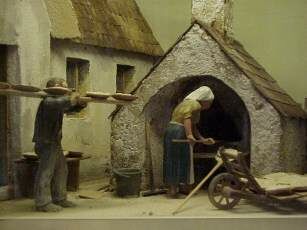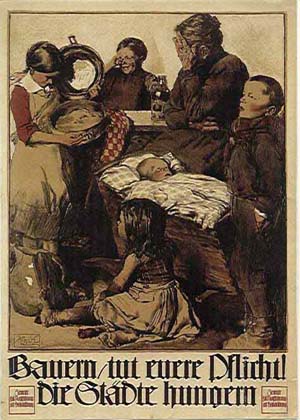 |
[ZAWiW] [gemeinsamlernen] [LiLL] | ||
|
|
|
|
| home | ||
|
|
Introduction | |
|
|
Questionnaire | |
|
|
Result Analysis | |
 |
||
Result Analysis
Stand:a) Which was the role of bread for the nutrition in the past?
b) Did there exist differences between children and adults, and between men and women?
c) Did there exist differences between city and country, between people working in the factories or in farm
houses?
The role of bread was more important at that time , as the part of bread in the total alimentation was high, it did not exist such a high variety of food. This was mentioned nearly by half of the inquired persons. A major part said that there were no differences between children and adults and between men and women.
The following quotations saying the contrary, i.e. that there really were differences:
A woman of 78 years from East Prussia: "During the
war the mothers gave their up-growing children a bigger portion of bread, they
themselves renounced of it. Later the father who had to work, obtained the
bigger part"
A woman, 62 years, from Graz (Austria): "We provided secretly our
children with something better, the man who had to work heavily received more."
Hint of two questioned persons that the heavy workers received from the
government more "food ration coupons" as supplementary ration for
heavy worker-
The difference between city and country shows the following quotations:
A woman , 72 years, from Ulm: "Those in the farm houses baked themselves.
They had flour also during the war. What was very important that they had a
baking oven. We had to carry everything to the baker for baking-off, and we had
to pay 10 Pfennig for it."
"In the city you were relying on the food ration coupons".
Regarding the difference between city and country, opinions are generally in common. The population in the countryside had always sufficient bread because of the availability of raw materials and the self-baking. The city population, however, went on "Hamstertour" (hoarding trip), scouring the countryside for food and giving as part payment valuables.
 |
 |
| Baking house in the country in 19. Century, model in the DBM | H. Hönsch “ Farmers do your duty”, poster 1919 DBM |
Summary
The answers of the questioned persons are partly different
which proves that people did experience the lack of food and the rationing
differently or they have different remembrance to it. Most of the questioned
persons were towns-people who may have looked enviously at the self-providing
country people. Therefore for many of them the hoarding trips to the countryside
was the way-out.
Obviously the mothers gave their children more than they had the right to
receive by the rationing system. Whoever lived on the countryside or in farm
houses did not have had problems with rationing.
